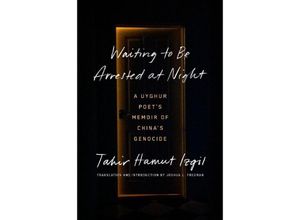Winner of the Moore Prize for Human Rights Writing Winner of the National Book Critics Circle
John Leonard Prize awarded to the best first book of the year Named one of the best books of
the year by: THE NEW YORK TIMES • THE WASHINGTON POST • THE ECONOMIST • TIME A poet's account
of one of the world's most urgent humanitarian crises and a harrowing tale of a family's
escape from genocide One by one Tahir Hamut Izgil's friends disappeared. The Chinese
government's brutal persecution of the Uyghur people had continued for years but in 2017 it
assumed a terrifying new scale. The Uyghurs a predominantly Muslim minority group in western
China were experiencing an echo of the worst horrors of the twentieth century amplified by
China's establishment of an all-seeing high-tech surveillance state. Over a million people have
vanished into China’s internment camps for Muslim minorities. Tahir a prominent poet and
intellectual had been no stranger to persecution. After he attempted to travel abroad in 1996
police tortured him until he confessed to fabricated charges and sent him to a re-education
through labor camp. But even having endured three years in the camp he could never have
predicted the Chinese government’s radical solution to the Uyghur question two decades later.
Was the first sign when Tahir was interrogated for hours after a phone call with a fellow poet
in the Netherlands? Or when his old friend was sentenced to life in prison simply for calling
for Uyghurs' legal rights to be enforced? Perhaps it was when the police seized Uyghurs’ radios
and installed jamming equipment to cut them off from the outside world. Once Tahir noticed
that the park near his home was nearly empty because so many neighbors had been arrested he
knew the police would be coming for him any day. One night after Tahir’s daughters were asleep
he placed by his door a sturdy pair of shoes a sweater and a coat so that he could stay warm
if the police came for him in the middle of the night. It was clear to Tahir and his wife that
fleeing the country was the family's only hope. Waiting to Be Arrested at Night is the story
of the political social and cultural destruction of Tahir Hamut Izgil's homeland. Among
leading Uyghur intellectuals and writers he is the only one known to have escaped China since
the mass internments began. His book is a call for the world to awaken to the unfolding
catastrophe and a tribute to his friends and fellow Uyghurs whose voices have been silenced.



